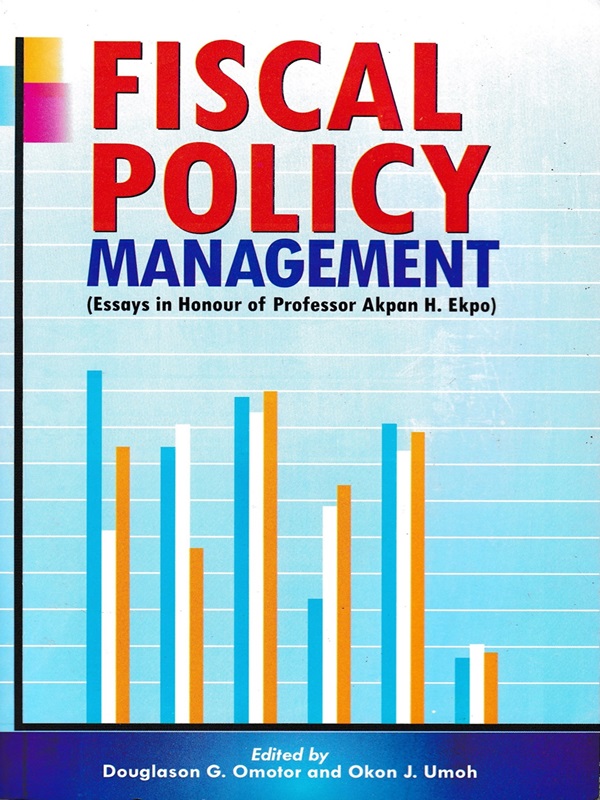FISCAL POLICY MANAGEMENT: Essays in Honour of Professor Akpan Ekpo
$10.00
FOREWARD
Fiscal Policy Management is an anthology of outstanding papers in honor of Professor Akpan Ekpo, a distinguished scholar and expert in Fiscal policy. How best taxes and public spending can be used to stabilize economic
activity has long dominated the discourse on Fiscal policy management. However, for developing economies, the bane of fiscal policy has been the pro-cyclical pattern of expansion and contraction during years of “boom and bust”. The implication is that it has been rather difficult for developing economies to achieve countercyclical fiscal policy. While this conclusion may be controversial and considered academic, there is clear evidence that only a few developing economies like Malaysia, Korea, Botswana and Chile have been able -to avoid pro—cyclicality.
Some countries like Nigeria, which is now sliding into recession, have fiat been so successful. Basically, Nigeria did not take advantage of its recent oil boom years to build fiscal buffers and eliminate budget deficits. The timing of the publication of this book on Fiscal Policy Management in honor of Professor Akpan H. Ekpo, a scholar who has made giant contributions in this area of economic science, could not be more apt or propitious. Although the debate over resource control and allocation, equity, environmental sustainability and poverty alleviation now dominates current discussion, strategies for achieving stabilization especially in the
short-run through decreasing fiscal deficit when output falls and increasing fiscal buffers in good times still matter for optimal fiscal policy management.
This anthology on ‘Fiscal Policy Management‘ contains both theoretical expositions and empirical presentations put together by friends and former students of Professor Akpan H. Ekpo. The first four Chapters offer a wide-ranging discussion on debt sustainability issues given its role in counter cyclicality and pro-cyclicality of fiscal policy regime. A convincing argument is that sound fiscal decisions are driven by good governance
architecture. Good governance enhances transparency and innovative thinking, widens creativity space, promotes macroeconomic stabilization, accountability, protects public interest and engenders public trust. These as
examined in Chapters 5, 6 and7, and may be regarded as the pathways to improving. people’s wellbeing especially in the developing countries of sub-Saharan Africa, which are often besmirched with institutional corruption and leadership rascality.
Past works during the 1990s by Professor Ekpo in fiscal policy management had proposed strategies to mitigate the economic effects of the reckless leadership syndrome not only at the national level but also for sub-national governments particularly in Nigeria, positing that the systemic waste associated with their operations
and performance was a rape of public trust. Presentations in Chapters 8, 9 and 10 are reminiscent of this. Indeed, it is demonstrated that the bailout tonic has become a moral hazard as tax payers have lost trust in government.
This Book of Readings, written in honor of Professor Akpan H. Ekpo, whose achievements and progress I have monitored over the years, provides an excellent addition‘ to theoretical and empirical discussion on fiscal policy management in Nigeria. I highly recommend the book to all — not only to students and academics but also to all those interested in the Nigerian project. The anthology makes an innnense contribution to the field of public finance and should be compulsory reading for experts in this field and policy makers in all sub-Saharan African countries.
Professor Milton A. Iyoha
University of Benin,
Benin City, Nigeria
June 2016
Description
CONTENTS
CHAPTER ONE: Overview of Contemporary Issues in Fiscal Policy Management in Nigeria
CHAPTER TWO: Fiscal cum Debt Sustainability: An Analytical Approach
CHAPTER THREE: Debt Sustainability and Attributes of Politicians in Selected African Countries
CHAPTER FOUR: Public and External Debt Sustainability in Nigeria
CHAPTER FIVE: Good Governance and Public Sector Financial Management
CHAPTER SIX: Innovation and Creativity in Public Sector Management in Nigeria
CHAPTER SEVEN: Effects of Budget on Selected Macroeconomic Variables: Evidence from Cameroun
CHAPTER EIGHT: State Governments in A Quandary in Nigeria Over Oil Price Decline: The Politics of Bailout Elixir
CHAPTER NINE: Tax Administration – The Theoretical Perspective
CHAPTER TEN: Composition of Public Expenditure and Economic Performance in Nigeria (1970-2012)
Additional information
| Contributors | List Contributors Dr. (Mrs.) Patricia ADAMU, West African Institute for Financial and Economic Management (WAIFEM), Lagos Nigeria Mr. Usenobong F. AKPAN, Department of Economics, University of Uyo, Nigeria Prof. Ademola ARIYO, Department of Economics, University of Ibadan, Nigeria Mr. Ibukun BEECROFT, Covenant University, Ota, Nigeria Mr. Chuku CHUKU, Department of Economics, University of Uyo, Nigeria and Department of Economics, University of Manchester, United Kingdom Dr. Uchenna R. EFOBI, Covenant University, Ota, Nigeria Prof. Festus O. EGWAIKHIDE, Department of Economics, University of Ibadan, Nigeria Mr. Stephen OLUWATOBI, Covenant University, Ota, Nigeria Mr. Sam OMORUYI, West African Institute for Financial and Economic Management (WAIFEM), Lagos Nigeria Prof. Douglason G. OMOTOR, Department of Economics, Delta State University, Abraka & West African Institute for Financial and Economic Management (WAIFEM), Lagos Nigeria Mr. Kenneth U. ONYE, Department of Economics, Ota, Nigeria Dr. Evans S. OSABUOHIEN, Covenant University, Ota,Nigeria Dr. Joseph TCHOKOTE, Department of Economics, University of Uyo, Nigeria Mr. Itoro P. UBI-ABAI, Department of Economics, University of Uyo, Nigeria Mr. Ubong UDONWA, Department of Economics, University of Uyo,Nigeria Dr. Okon J. UMOH, West African Institute for Financial and Economic Management (WAIFEM), Lagos Nigeria and Department of Economics, University of Uyo, Nigeria |
|---|
Questions and Answers
You are not logged in

